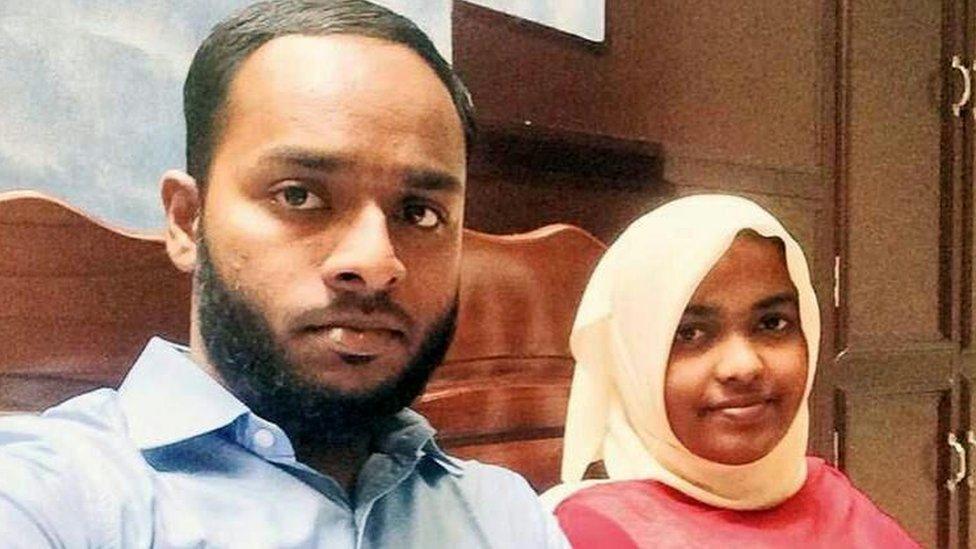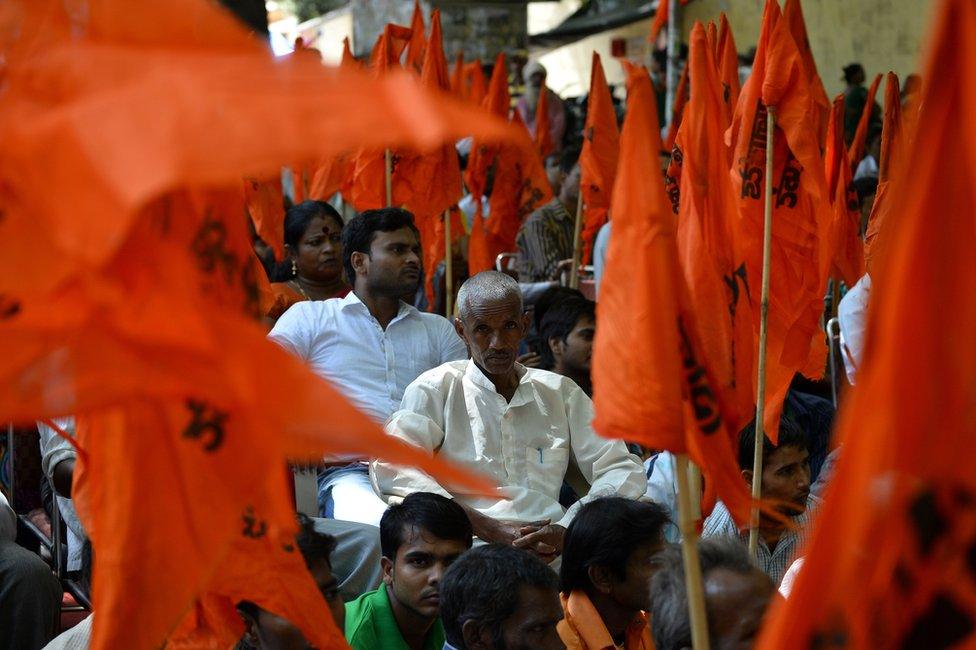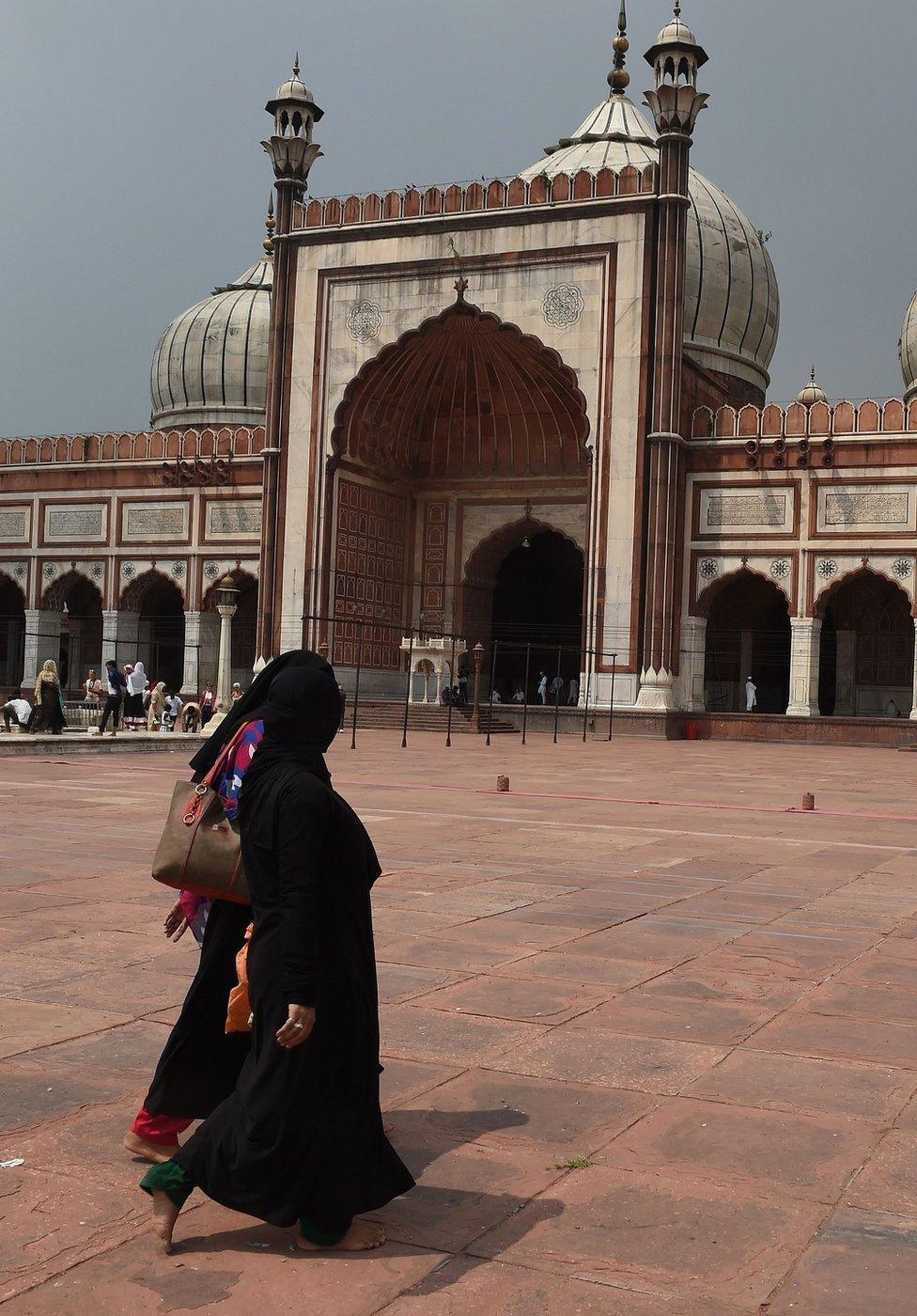The Hindu-Muslim marriage stuck in India's Supreme Court
- Published

Shafin Jahan claims he met Hadiya on a matrimonial website
The decision by an Indian court in May to annul the marriage of a Hindu woman who converted to Islam and married a Muslim man has grabbed headlines in the country, with many referring to it as a strike against "love jihad".
The term was popularised by radical Hindu fringe groups, who accuse Muslim men of participating in a "conspiracy to turn Hindu women from their religion by seducing them".
Marriages between Hindus and Muslims have long attracted censure in conservative Indian families, but the attachment of a deeper, sinister motive to them is a recent phenomenon.
The ruling in the southern Indian state of Kerala came despite the woman claiming that she converted to Islam of her own free will.
An appeal by the couple, Hadiya and Shafin Jahan, is now being heard by the Supreme Court, which has ordered an independent investigation into the matter.
The case has already seen the involvement of the country's National Investigative Agency (NIA) who say they are looking into Mr Jahan's allegedly "radical" views and his suspected links to banned Islamic groups.
Here is what we know about the case so far.
What's it all about?
In January 2016, Hadiya Jahan, 23, previously known by her Hindu name, Akhila Asokan, converted to Islam. She was sharing a house with two Muslim girls who were her classmates.
She was studying in the southern state of Tamil Nadu at the time. Her parents lived in the neighbouring state of Kerala.
Her father, KM Asokan, approached the courts in an effort to locate her because, according to him, she had stopped communicating with her parents while she was away at college.
When her parents found out she had turned to Islam, Mr Asokan petitioned the Kerala High Court, alleging that their daughter had been forcibly converted and was being held against her will.
But Ms Jahan told the court that she chose to convert because she was impressed with her two Muslim housemates praying and practicing Islam. So the court ruled that she was free to do as she chose, since there was no evidence of "illegal confinement" as alleged by Mr Asokan.
But Mr Asokan told the BBC that his daughter had been "brainwashed" by her housemates and people known to them.
"They wanted to send her to Syria," he said. "I got to know about it when she told me over the phone. I recorded that conversation and I filed a case."
Mr Asokan again appealed to the high court in August 2016 claiming that he believed Ms Jahan was going to travel outside of India.
During the hearing of the second case, Ms Jahan had married a Muslim man, Shafin, who she met on a matrimonial website.
This time, a different set of judges ruled in Mr Asokan's favour, annulling the Jahans' marriage and questioning if Ms Jahan's conversion was indeed voluntary.
"This is not a love jihad case. This is a case of forcible conversion,'' Mr Asokan's lawyer, C Ravindran, said. She was forced to convert in January, Mr Ravindran said, but she married only in December.

Radical Hindu fringe groups have held protests against an alleged "love jhad" movement
What did the high court in Kerala say?
The high court in Kerala issued two rulings, one in January 2016 and the other in May 2017. The first ruled in Ms Jahan's favour, dismissing Mr Asokan's petition that his daughter was not acting of her own free will.
But the second ruling questioned Ms Jahan's decision to convert to Islam, observing that "radical organisations" converted "young girls of Hindu religion" on the "pretext of love". The court used language that resembles the popular definition of "love jihad."
The court declared the marriage to be a "sham", citing several reasons, from Ms Jahan's "weak and vulnerable" state "as a girl aged 24 years" to Mr Jahan's alleged radical views to the judges' opinion that a decision about marriage can be taken "only with the active involvement of her parents".
The court also "granted custody" of Ms Jahan to her parents.
"It's the most absurd order you can come across," Dushyant Dave, Mr Jahan's lawyer, told the BBC.
Her father had filed a habeas corpus plea, a writ which requires a person detained by the authorities be brought before a court of law so that the legality of the detention may be examined. So the court's job was done, Mr Dave said, once Ms Jahan appeared before the judges "alive and well".
The order, which drew , externalcriticism, external in the media, also surprised lawyers.
Karuna Nundy, a Supreme Court lawyer, described it as "completely without jurisdiction" because the court seemed to be "attributing false consciousness" to Ms Jahan by assuming that she was not acting of her own free will.
"The high court can't annul the marriage," she added. "That aspect is bizarre."
What's happening with the case?
The case is being heard in India's Supreme Court after Shafin Jahan appealed the high court's verdict.
The Supreme Court refused to overturn the annulment without "inputs from all sides", but questioned, external whether the Kerala High Court should have annulled the marriage of two consenting adults.
The court also asked the NIA, which investigates terror cases, to probe the Jahans' marriage - while cautioning against the use of labels such as "love jihad".
The NIA has since informed the court that it believes there are other cases where Hindu women were "lured", external into converting to Islam, allegedly to recruit them to terror causes.
The agency said it had found a common link between Ms Jahan's case and another case of alleged "forcible conversion". A woman named Sainaba had been a "mentor" to the women in both cases during the time they are believed to have converted to Islam.
Sainaba, according to the NIA, is linked to the Popular Front of India, which is suspected of being a radical Islamic organisation.

Marriages between Hindus and Muslims have long attracted censure in conservative families
But some lawyers argue that the NIA's investigation should have no bearing on the fate of these marriages.
"Even if there is a massive conspiracy to lure women and get them to join IS, it is for the women to decide whether to stay married to the men or not," said Ms Nundy. "Even convicted criminals have a right to be married."
The NIA has not yet responded to the BBC's request for a comment.
What is happening with the couple?
Ms Jahan is living in her parent's house where the court ordered her to go in May 2017.
Mr Jahan said he has tried contacting her but there has been no response yet. He also alleged that he wasn't allowed to enter her parents' house when he tried visiting her.
When Mr Asokan was asked about the allegation that his daughter wasn't being allowed to speak to anyone, he told the BBC, "Whom does she have to meet ? If there are relatives, she can meet them. There is no need for her to meet others."
"It was the court's decision to send my daughter to my house," he added. "So, why are all kinds of people coming to see her? They have to go to the court if they want to meet her. Why am I being troubled?"
Ms Jahan hasn't appeared in court, as she was told they don't want to hear from her yet.
The couple declined to speak to the BBC while the case was ongoing.
With additional reporting by Aparna Alluri in Delhi